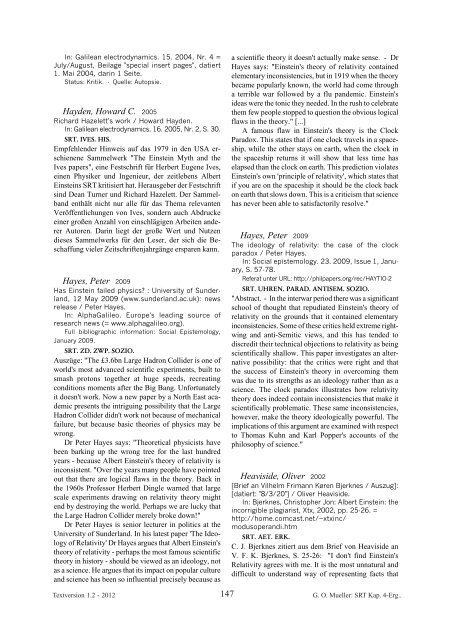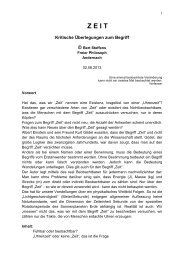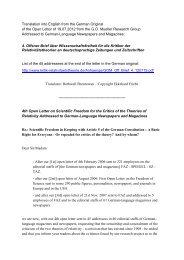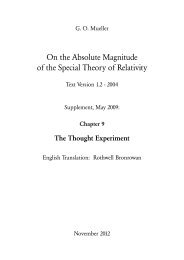2394 weitere kritische Veröffentlichungen - Kritische Stimmen zur ...
2394 weitere kritische Veröffentlichungen - Kritische Stimmen zur ...
2394 weitere kritische Veröffentlichungen - Kritische Stimmen zur ...
Erfolgreiche ePaper selbst erstellen
Machen Sie aus Ihren PDF Publikationen ein blätterbares Flipbook mit unserer einzigartigen Google optimierten e-Paper Software.
In: Galilean electrodynamics. 15. 2004, Nr. 4 =<br />
July/August, Beilage "special insert pages", datiert<br />
1. Mai 2004, darin 1 Seite.<br />
Status: Kritik. - Quelle: Autopsie.<br />
Hayden, Howard C. 2005<br />
Richard Hazelett's work / Howard Hayden.<br />
In: Galilean electrodynamics. 16. 2005, Nr. 2, S. 30.<br />
SRT. IVES. HIS.<br />
Empfehlender Hinweis auf das 1979 in den USA erschienene<br />
Sammelwerk "The Einstein Myth and the<br />
Ives papers", eine Festschrift für Herbert Eugene Ives,<br />
einen Physiker und Ingenieur, der zeitlebens Albert<br />
Einsteins SRT kritisiert hat. Herausgeber der Festschrift<br />
sind Dean Turner und Richard Hazelett. Der Sammelband<br />
enthält nicht nur alle für das Thema relevanten<br />
<strong>Veröffentlichungen</strong> von Ives, sondern auch Abdrucke<br />
einer großen Anzahl von einschlägigen Arbeiten anderer<br />
Autoren. Darin liegt der große Wert und Nutzen<br />
dieses Sammelwerks für den Leser, der sich die Beschaffung<br />
vieler Zeitschriftenjahrgänge ersparen kann.<br />
Hayes, Peter 2009<br />
Has Einstein failed physics? : University of Sunderland,<br />
12 May 2009 (www.sunderland.ac.uk): news<br />
release / Peter Hayes.<br />
In: AlphaGalileo. Europe's leading source of<br />
research news (= www.alphagalileo.org).<br />
Full bibliographic information: Social Epistemology,<br />
January 2009.<br />
SRT. ZD. ZWP. SOZIO.<br />
Auszüge: "The £3.6bn Large Hadron Collider is one of<br />
world's most advanced scientific experiments, built to<br />
smash protons together at huge speeds, recreating<br />
conditions moments after the Big Bang. Unfortunately<br />
it doesn't work. Now a new paper by a North East academic<br />
presents the intriguing possibility that the Large<br />
Hadron Collider didn't work not because of mechanical<br />
failure, but because basic theories of physics may be<br />
wrong.<br />
Dr Peter Hayes says: "Theoretical physicists have<br />
been barking up the wrong tree for the last hundred<br />
years - because Albert Einstein's theory of relativity is<br />
inconsistent. "Over the years many people have pointed<br />
out that there are logical flaws in the theory. Back in<br />
the 1960s Professor Herbert Dingle warned that large<br />
scale experiments drawing on relativity theory might<br />
end by destroying the world. Perhaps we are lucky that<br />
the Large Hadron Collider merely broke down!"<br />
Dr Peter Hayes is senior lecturer in politics at the<br />
University of Sunderland. In his latest paper 'The Ideology<br />
of Relativity' Dr Hayes argues that Albert Einstein's<br />
theory of relativity - perhaps the most famous scientific<br />
theory in history - should be viewed as an ideology, not<br />
as a science. He argues that its impact on popular culture<br />
and science has been so influential precisely because as<br />
a scientific theory it doesn't actually make sense. - Dr<br />
Hayes says: "Einstein's theory of relativity contained<br />
elementary inconsistencies, but in 1919 when the theory<br />
became popularly known, the world had come through<br />
a terrible war followed by a flu pandemic. Einstein's<br />
ideas were the tonic they needed. In the rush to celebrate<br />
them few people stopped to question the obvious logical<br />
flaws in the theory." [...]<br />
A famous flaw in Einstein's theory is the Clock<br />
Paradox. This states that if one clock travels in a spaceship,<br />
while the other stays on earth, when the clock in<br />
the spaceship returns it will show that less time has<br />
elapsed than the clock on earth. This prediction violates<br />
Einstein's own 'principle of relativity', which states that<br />
if you are on the spaceship it should be the clock back<br />
on earth that slows down. This is a criticism that science<br />
has never been able to satisfactorily resolve."<br />
Hayes, Peter 2009<br />
The ideology of relativity: the case of the clock<br />
paradox / Peter Hayes.<br />
In: Social epistemology. 23. 2009, Issue 1, January,<br />
S. 57-78.<br />
Referat unter URL: http://philpapers.org/rec/HAYTIO-2<br />
SRT. UHREN. PARAD. ANTISEM. SOZIO.<br />
"Abstract. - In the interwar period there was a significant<br />
school of thought that repudiated Einstein's theory of<br />
relativity on the grounds that it contained elementary<br />
inconsistencies. Some of these critics held extreme rightwing<br />
and anti-Semitic views, and this has tended to<br />
discredit their technical objections to relativity as being<br />
scientifically shallow. This paper investigates an alternative<br />
possibility: that the critics were right and that<br />
the success of Einstein's theory in overcoming them<br />
was due to its strengths as an ideology rather than as a<br />
science. The clock paradox illustrates how relativity<br />
theory does indeed contain inconsistencies that make it<br />
scientifically problematic. These same inconsistencies,<br />
however, make the theory ideologically powerful. The<br />
implications of this argument are examined with respect<br />
to Thomas Kuhn and Karl Popper's accounts of the<br />
philosophy of science."<br />
Heaviside, Oliver 2002<br />
[Brief an Vilhelm Frimann Køren Bjerknes / Auszug]:<br />
[datiert: "8/3/20"] / Oliver Heaviside.<br />
In: Bjerknes, Christopher Jon: Albert Einstein: the<br />
incorrigible plagiarist, Xtx, 2002, pp. 25-26. =<br />
http://home.comcast.net/~xtxinc/<br />
modusoperandi.htm<br />
SRT. AET. ERK.<br />
C. J. Bjerknes zitiert aus dem Brief von Heaviside an<br />
V. F. K. Bjerknes, S. 25-26: "I don't find Einstein's<br />
Relativity agrees with me. It is the most unnatural and<br />
difficult to understand way of representing facts that<br />
Textversion 1.2 - 2012 147<br />
G. O. Mueller: SRT Kap. 4-Erg..





